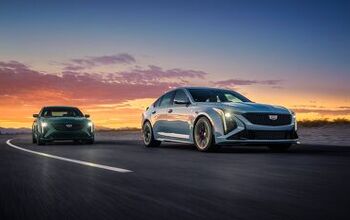TTAC News Round-up: Clock Ticks at Volkswagen, CEO Switch and Volvo Sees a Chance

The Environmental Protection Agency is pointing at its watch and glaring at Volkswagen.
That, an opening for the Swedes, an electric propulsion prediction, a high-end guy gets a new job, and Tesla gets targeted in Hoosierville … after the break!
Beware the (end) of March
According to Automotive News, the United States is getting impatient for Volkswagen AG to hatch a plan to fix close to 600,000 vehicles involved in the ongoing diesel emissions scandal.
A federal judge is giving the automaker until March 24 to show authorities how it will make the affected vehicles comply with strict EPA emissions laws.
With the clock ticking and engineers scrambling, VW’s oil burners have their builders over a barrel.
Fully-charged kind of life
The price of electric vehicles will match their gasoline-powered brethren in less than a decade, posits Bloomberg Business.
A study by Bloomberg New Energy Finance puts the price of both types of vehicle on par with each other by the mid-2020s.
Cheaper battery packs with longer, anxiety-lessening ranges are forecasted to create an explosion of EV sales in the coming decade, compared to the very modest sales they see today.
Audi bullish on new Quattro CEO
The Audi division that pumps out the automaker’s high-performing R and RS models is getting a high-octane boss.
Stephan Winkelmann, who served as president and CEO of Lamborghini for 11 years, is moving to head up the Quattro subsidiary of Lambo’s parent company. Filling the void left by Winkelmann’s departure will be former Ferrari Formula One team boss Stefano Domenicali.
Lamborghini’s profile — and sales — rose sharply under Winkelmann’s guidance, and they’re little doubt that Audi hopes he’ll do the same for their top-end product line.
The future belongs to Volvo
The Swedish automaker sees itself at the brink of renewed relevance and prosperity, according to an Automotive News interview with Volvo CEO Hakan Samuelsson.
Growing demand for efficient gasoline and plug-in hybrid models in Europe and North America is changing the landscape on both sides of the Atlantic, he argued, and will position Volvo to gain market share and a better financial footing.
Recent models like the award-winning XC90 and imminent S90 line are the best evidence that Volvo wants to regain its status as a major player in the luxury import market.
Tesla’s fate put on hold in Indiana
Tesla fans in the Hoosier State raised a ruckus over plans to ban the sale of the company’s EVs, which could be the reason behind a delay in the state’s “Kill Tesla” bill, reports Hybrid Cars.
The protests raised national attention over the state’s attempt to block the sale of Tesla vehicles due to the company’s absence of physical dealerships.
With the proposed legislation now sent off to a committee for further study, Tesla has scored a year-long reprieve from the bureaucratic chopping block.

More by Steph Willems
Latest Car Reviews
Read moreLatest Product Reviews
Read moreRecent Comments
- Redapple2 Love the wheels
- Redapple2 Good luck to them. They used to make great cars. 510. 240Z, Sentra SE-R. Maxima. Frontier.
- Joe65688619 Under Ghosn they went through the same short-term bottom-line thinking that GM did in the 80s/90s, and they have not recovered say, to their heyday in the 50s and 60s in terms of market share and innovation. Poor design decisions (a CVT in their front-wheel drive "4-Door Sports Car", model overlap in a poorly performing segment (they never needed the Altima AND the Maxima...what they needed was one vehicle with different drivetrain, including hybrid, to compete with the Accord/Camry, and decontenting their vehicles: My 2012 QX56 (I know, not a Nissan, but the same holds for the Armada) had power rear windows in the cargo area that could vent, a glass hatch on the back door that could be opened separate from the whole liftgate (in such a tall vehicle, kinda essential if you have it in a garage and want to load the trunk without having to open the garage door to make room for the lift gate), a nice driver's side folding armrest, and a few other quality-of-life details absent from my 2018 QX80. In a competitive market this attention to detai is can be the differentiator that sell cars. Now they are caught in the middle of the market, competing more with Hyundai and Kia and selling discounted vehicles near the same price points, but losing money on them. They invested also invested a lot in niche platforms. The Leaf was one of the first full EVs, but never really evolved. They misjudged the market - luxury EVs are selling, small budget models not so much. Variable compression engines offering little in terms of real-world power or tech, let a lot of complexity that is leading to higher failure rates. Aside from the Z and GT-R (low volume models), not much forced induction (whether your a fan or not, look at what Honda did with the CR-V and Acura RDX - same chassis, slap a turbo on it, make it nicer inside, and now you can sell it as a semi-premium brand with higher markup). That said, I do believe they retain the technical and engineering capability to do far better. About time management realized they need to make smarter investments and understand their markets better.
- Kwik_Shift_Pro4X Off-road fluff on vehicles that should not be off road needs to die.
- Kwik_Shift_Pro4X Saw this posted on social media; “Just bought a 2023 Tundra with the 14" screen. Let my son borrow it for the afternoon, he connected his phone to listen to his iTunes.The next day my insurance company raised my rates and added my son to my policy. The email said that a private company showed that my son drove the vehicle. He already had his own vehicle that he was insuring.My insurance company demanded he give all his insurance info and some private info for proof. He declined for privacy reasons and my insurance cancelled my policy.These new vehicles with their tech are on condition that we give up our privacy to enter their world. It's not worth it people.”







































Comments
Join the conversation
Volvo is no more Chinese than JLR is Indian (TATA). An mentioned in another post the money is delivered from the owners, but they're largely hands off so as to retain the valuable heritage links with the respective home markets.
New Volvos in the showroom look and feel enough like my 20 year old one that I really don't care who owns the company...if I have a good sales year, I'd love to put a new V90 in my garage. We just leased a Canadian-built Honda CR-V, don't care which plant it came out of, as long as it's reliable for the next 3 years. Automakers are multi-national conglomerates, and where the owners are based is irrelevant to me.